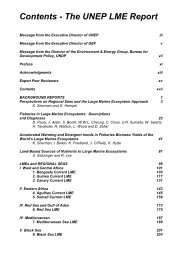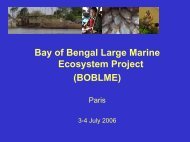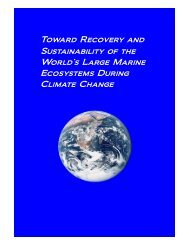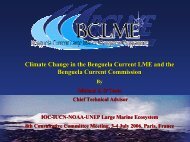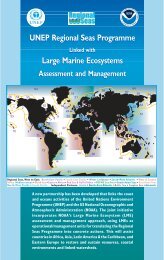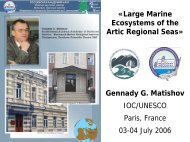Sustaining the World's Large Marine Ecosystems
Sustaining the World's Large Marine Ecosystems
Sustaining the World's Large Marine Ecosystems
Create successful ePaper yourself
Turn your PDF publications into a flip-book with our unique Google optimized e-Paper software.
GEF Support for <strong>the</strong> Global Movement toward <strong>the</strong><br />
Improved Assessment and Management of<br />
<strong>Large</strong> <strong>Marine</strong> <strong>Ecosystems</strong><br />
Alfred M. Duda, Senior Advisor<br />
Global Environment Facility<br />
Washington, DC<br />
While our planet’s coastal and marine assets have been in trouble for a while,<br />
recent information has documented beyond a doubt <strong>the</strong> scale and severity of<br />
risks to humanity associated with depletion and degradation of near coastal<br />
oceans and <strong>the</strong>ir contributing watersheds. Lack of attention to policy and legal<br />
and institutional reforms has resulted in coastal freshwater depletion, pollution<br />
from sewage and industrial wastes, human health risks, coastal groundwater<br />
supply contamination, overexploitation of fisheries, <strong>the</strong> destruction of<br />
economically important coastal habitats like coral reefs, diseases and alien<br />
species propagated by maritime transport. All <strong>the</strong>se trends lead to socioeconomic<br />
losses.<br />
The Global Environment Facility (GEF) has recognized <strong>the</strong>se concerns since <strong>the</strong><br />
early 1990s, and has responded with an ecosystem-based approach to <strong>the</strong><br />
assessment and management of <strong>Large</strong> <strong>Marine</strong> <strong>Ecosystems</strong> (LMEs) across <strong>the</strong><br />
world in order to stem <strong>the</strong> tide of depletion and degradation, and lead <strong>the</strong><br />
transition to ocean security. This paper describes <strong>the</strong> approach adopted by <strong>the</strong><br />
GEF in <strong>the</strong> last dozen years to create a movement in support of<br />
intergovernmental instruments to reverse <strong>the</strong> downward spiral of coastal and<br />
marine resources. One hundred and thirty two nations are working toge<strong>the</strong>r in<br />
GEF International Waters projects to support this movement with improved<br />
human capacity, governance reforms, and critical investments.<br />
The GEF approach at different scales is described, along with some early results<br />
of <strong>the</strong> type of decadal long effort needed to make real changes in human<br />
behavior. As GEF enters a phase that will invest in <strong>the</strong> LME movement, its future<br />
focus depends on <strong>the</strong> amount of GEF replenishment funding provided by<br />
industrialized countries to catalyze actions, and on <strong>the</strong> commitments coming from<br />
developing countries to adopt collective reforms and utilize available financing for<br />
investments. When industrialized countries are lukewarm in support of GEF<br />
efforts to assist developing nations in sustaining ocean goods and services, <strong>the</strong><br />
world community should expect little action in return.<br />
The collective actions of many countries are needed to cope with shifts in climate<br />
and <strong>the</strong> impacts of globalization, with its financial pressures that fur<strong>the</strong>r stress<br />
1



